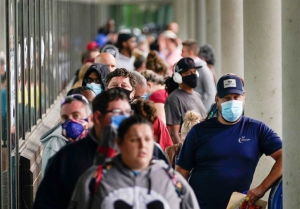By: Danielle A Greenberg, 2L
If COVID is an invisible enemy, it has successfully held the U.S. under siege for several months. And with resources running low, both the Legislature and the Trump Administration have decided to follow the example set by Vercengetorix, expelling their most vulnerable citizens into a no-man’s-land of debt and financial insecurity.
Before the U.S. pandemic outbreak, the American household debt was steadily rising, with many already in financial straits. Between ill health, shutdowns, and furloughs caused by COVID, Americans are now finding their savings squeezed and debts mounting. Like many countries, the U.S. has tried to keep families afloat through financial stimulus. But months into the pandemic, piecemeal government programs are increasingly expensive (and partisan) to maintain and thus are slowing down.
Unfortunately, this leaves cash-strapped Americans with few options for liquidity vulnerable to predatory payday lenders. On July 07, 2020, the Consumer Financial Protection Bureau (CFPB) loosened previously placed restrictions on payday lenders; specifically, the CFPB will no longer require that payday lenders verify consumers are able to repay the loans when due. And considering that payday lenders charge interest rates as high as 400% APR, this means many taking out loans to make ends meet will find themselves in a vicious cycle of debt and insolvency for years to come. Moreover, minority communities, the newly unemployed, and the working poor are likely the hardest hit by the change as COVID has disproportionately affected these communities.
The U.S. response to the virus is not simply a political issue for the November ballot. Our response must address health issues, economic issues, racial issues, and even environmental issues because, while COVID has exacerbated these issues, their core is structural. Which is to say that the heart of these issues is fundamentally a legal one: how do we design a more resilient system?
In the short term, the answer is more legislated support for American workers and families most affected by the virus and most in need of financial security. In particular, legislators on both the state and federal levels should look to implement projects that improve infrastructure while providing short-term work for the mass of recently unemployed Americans à la New Deal. Looking to the long term, this means—at minimum—developing a national pandemic response plan that can be mobilized as soon as an outbreak starts. It means developing systems of support we can adapt and expand in times of crisis, e,g, the European pandemic stimulus approach. It also means taking a long, hard look at Government spending and taxation policies, because the U.S. is now facing the largest deficit in its history and debt to match, with the potential to become the first domino in the next global recession.
Those who fail to learn from history are condemned to repeat it, so it is worth mentioning Vercengetorix lost the battle of Alesia despite sacrificing the vulnerable. We cannot afford to lose the battle against COVID, and we certainly cannot afford to sacrifice vulnerable Americans to do so.





